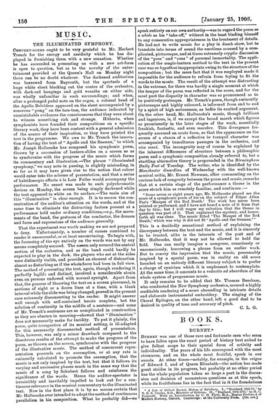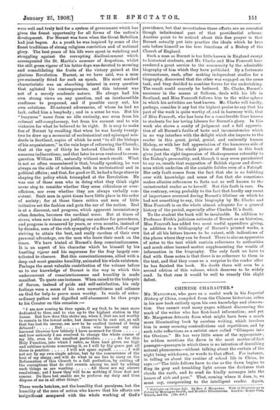BOOKS.
BURNET.*
BURNET was one of those rare and fortunate men who seem to have fallen upon the exact period of history best suited to give fullest scope to their special form of activity and individuality. The years of his life correspond with the most strenuous, and on the whole most fruitful, epoch in our annals. At other times‚ÄĒnotably, for example, in the reigns of Edward I. and of Queen Elizabeth‚ÄĒthe nation has made great strides in its progress, but probably at no other period has the whole population taken so large a part in the discus- sion and decision of momentous questions as at this epoch, while its fruitfulness lies in the fact that in it the foundations ‚ÄĘ A Life of Gilbert Burhet, Bishop of Balislitry. L; "ScotlItad;1St3-74," by T. E. S. Clarke, B.D., Minister of Balboni'. H., "England, 1674-1715," by EL C. Forcroft. With an Introduction by C. H. Firth, M.A., Regina Professor of Modern History, Oxford. Cambridge : at the University Priem [15s. net.)
were well and truly laid for a system,of government which has given the freest opportunity for all forms of the nation's development. For Burnet was born when the Great Rebellion had just begun. As a youth he was inspired by some of the finest traditions of strong religious conviction and of national glory. The best years of his life were spent in watching and struggling against the corrupting disillusionment which accompanied the St. Martin's summer of despotism, whilst the still green vigour of his latter days was devoted to securing and consolidating the fruits of the victory gained at the glorious Revolution. Barnet, as we have said, was a man pre-eminently fitted for such an epoch. His most marked characteristic was an absorbing interest in every question that agitated his contemporaries, and this interest was not of a merely academic nature. He always had his own strong views on any question, and an inexhaustible readiness to propound, and if possible carry out, his own solutions. Ill-natured adversaries, of whom he had no lack, called him a busybody ; and in a sense he was. But his " busyness " came from no idle curiosity, nor even from his colossal self-complacency, but from his earnest zeal to win victories for what he believed to be right. It is easy to make fun of Burnet by recalling that when he was barely twenty- two be drew up a memorial of ecclesiastical and episcopal mis- deeds in Scotland, copies of which he sent "to all the bishops of his acquaintance," in the vain hope of reforming the Church;
that at the age of thirty he lectured Charles II. on his amorous indiscretions; and that later he even ventured to cross- question William III., naturally without much result. What
is not so often remembered is that, broadly speaking, he was always on the side of toleration, both in ecclesiastical and in political affairs ; and that, for good or ill, he had a large share in shaping the policy which triumphed at the Revolution. He was one of those men who in doing what they think right never stop to consider whether they seem ridiculous or over- officious, nor even whether they are always verbally con- sistent. Such men in quiet times have little place in the order of society ; for at those times critics and men of little initiative set the fashion and gain the ear of the nation. Zeal is at a discount, and progress, which apparent inconsistency often denotes, becomes the cardinal error. But at times of stresi, when new ideas are jostling one another for precedence, and progress is measured by years, or even months, instead of by decades, men of the rich sympathy of a Burnet, full of eager striving to attain the best, and really careless of their own personal advantage, are the men who leave their mark on the times. We have hinted at Burners deep conscientiousness. It is an aspect of his character which he himself by his bustling vigour and his eagerness for the fray largely con- tributed to obscure. But this conscientiousness, allied with a deep and most genuine humility, animated his whole existence. Perhaps the most valuable contribution of the volume before us to our knowledge of Burnet is the way in which this undercurrent of conscientiousness and humility is made manifest. To quote one instance. When raised, to the bishopric of Sarum, instead of pride and self-satisfaction, his only feelings were a sense of his own unworthiness and reliance ‚ÄĘ on God for help to prove more worthy. In words of extra- ordinary pathos and dignified self-abasement he thus prays to his Creator on this occasion :‚ÄĒ
"I am now 6oming to thee again, 0 my God, to be once more dedicated to thee, and to rise up to the highest station in thy house. But how does this strike me, when I, that am not worthy to remain in the lowest order, but deserve to be cast out, as salt that has lost its savour, am now to be exalted instead of being
debasedt But thou who knowest my sins knowest likewise how bitterly I have mourned for them and how seriously I am resolved to change the whole course of
my life, even to the smallest particulars As for this Holy Function, into which I enter, as thou bast given me high and sublime notions concerning it, so I will by thy grace put all
these in practice I will not spare myself I will not act by my own single advice, but by the concurrence of the best of my clergy, and will do what in me lies to carry on the Reformation of this Church to a full perfection, by cutting off the corruptions that do still remain among us, and by adding such things as are wanting - All these are my sincere resolutions; yet I know they will be as nothing if thou dost not concur. Do thou but enable me to perform my duty and then dispose of me in all other things."
These words betoken, not the humility that paralyses, but the
humility of-the man of action who knows that his efforts are co Insignificant compared with the whole working of God's Trench, and Co. [15s. net.I
providence, but that nevertheless those efforts are an essential though infinitesimal part of that providential scheme. Another point to- be noticed about this fine prayer is that Burnet actually put into practice the ideals which he here sets before himself as the true functions of a Bishop of the Church of England. ‚ÄĘ
Such a man as Burnet is too little known in England except to historical students, and Mr. Clarke and Miss Foxcroft have rendered a great service to the community by.the admirable biography. of him which they have published. By a fortunate circumstance, each, after making independent studies for a biography, discovered that the other was engaged on the same task, and they decided to combine forces for the undertaking. The result could scarcely be bettered. Mr. Clarke, Burners successor in the manse at Saltoun, deals with his life in Scotland, and Miss Foxcroft follows him to the wider sphere in which his activities are best known. Mr. Clarke will hardly, perhaps, consider it any but the highest praise to say that his part of the work is quite worthy- of, and in harmony with, that of Miss Foxcroft, who has been for a considerable time known to students for her loving labours for Burnet's glory. -In- this work she shows a sanity of judgment and a full apprecia tion of all Burners faults of taste and inconsistencies which in no way interfere with the delight which she imparts to the reader in this great, jovial, genial, and eminently human Bishop, or with her full appreciation of the humorous side of his character. The whole picture of Burnet in this book gives just the right impression of Shakespearean rotundity to the Bishop's personality, and, though it may seem paradoxical to say so, recalls that suggestion of British vigour and direct- ness which underlies all the amiable foibles even of a Falstaff. Her only fault comes from the fact that she is so bubbling over with knowledge and sense of fun that she somethnes makes allusive references to facts not so well known to the uninstructed reader as to herself. But this fault is rare. On the contrary, owing probably to the fact that hardly any event of importance occurred during Burners lifetime on which he bad not something to say, this biography by Mr. Clarke and Miss Foxcroft is on the whole almost adequate for a general history of the period, especially after Charles II.'s death.
To the student the book will be invaluable. In addition to Professor Firth's judicious estimate of Burnet as an historiau, Miss Foxcroft has added two most useful appendices giving, in addition to a bibliography of Burnet's printed works, a list of all his letters known to be extant, with indications of the places where they can be found. There is also an apparatus of notes to the text which contain references to authorities and much other learned matter supplementing the wealth of information in the biography. The only fault we have to find with these notes is that there is no reference to them in the text, and that they come as a surprise to the reader after be has finished the book. No doubt there will soon be a second edition of this volume, which deserves to be widely read. In that case it would be well to remedy this slight defect.





















































 Previous page
Previous page